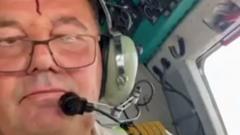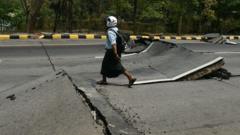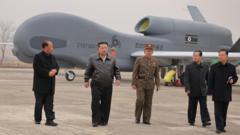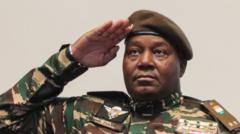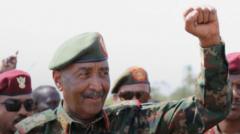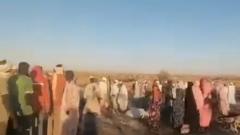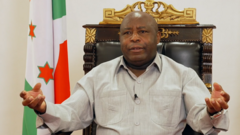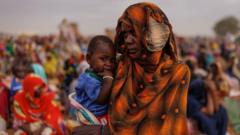In a dramatic shift in nearly two years of civil war, paramilitary forces known as the Rapid Support Forces (R.S.F.) have begun to withdraw from Khartoum, marking a significant win for Sudan’s military. This change comes after the army captured key locations in the capital, including the presidential palace, and has driven down enemy fighters into other regions of Sudan, notably their stronghold in Darfur.
Paramilitary Forces Retreat as Sudanese Army Gains Ground

Paramilitary Forces Retreat as Sudanese Army Gains Ground
Sudan's military drives out Rapid Support Forces from Khartoum, signifying a turning point in the ongoing civil conflict.
As the army consolidates its hold over the capital, drone footage captured by Sudan’s military reveals hundreds of R.S.F. soldiers fleeing through a critical escape route. Military spokesperson Brig. Gen. Nabil Abdullah confirmed that a major R.S.F. camp had been captured, stating: “This was their last remaining camp in Khartoum.” Analysts suggest that the ongoing conflict, which has already claimed an estimated 150,000 lives and displaced over 13 million people, may be reaching a crucial inflection point.
Civilians responded to the military's advances by celebrating in the streets, sharing footage on social media platforms as soldiers rolled into Kalakla, a suburb of Khartoum. The fervor illustrates a new chapter in a fight that has been wrought with death and destruction, with many fleeing from atrocities such as rape and starvation.
The military's recent victories coincide with the withdrawal of R.S.F. forces from the presidential palace and control over the international airport, a move heralded as a deepening of the military's authority in the capital. Despite these advances, pockets of R.S.F. fighting have persisted, with sporadic gunfire echoing through the largely deserted city center and recent shelling indicating that the R.S.F. continues to pose challenges, primarily from their remaining positions in Omdurman.
The Sudanese civil war, now regarded as the largest conflict in Africa, ignited two years ago when tensions erupted between military leaders over the integration of R.S.F. forces into the army. As the military pushes forward, the broader implications of the shifting landscape in Khartoum could reverberate across the region, impacting millions both inside and outside Sudan.
Declan Walsh, reporting from Khartoum, continues to bring updates on this evolving situation as it unfolds.
Civilians responded to the military's advances by celebrating in the streets, sharing footage on social media platforms as soldiers rolled into Kalakla, a suburb of Khartoum. The fervor illustrates a new chapter in a fight that has been wrought with death and destruction, with many fleeing from atrocities such as rape and starvation.
The military's recent victories coincide with the withdrawal of R.S.F. forces from the presidential palace and control over the international airport, a move heralded as a deepening of the military's authority in the capital. Despite these advances, pockets of R.S.F. fighting have persisted, with sporadic gunfire echoing through the largely deserted city center and recent shelling indicating that the R.S.F. continues to pose challenges, primarily from their remaining positions in Omdurman.
The Sudanese civil war, now regarded as the largest conflict in Africa, ignited two years ago when tensions erupted between military leaders over the integration of R.S.F. forces into the army. As the military pushes forward, the broader implications of the shifting landscape in Khartoum could reverberate across the region, impacting millions both inside and outside Sudan.
Declan Walsh, reporting from Khartoum, continues to bring updates on this evolving situation as it unfolds.


